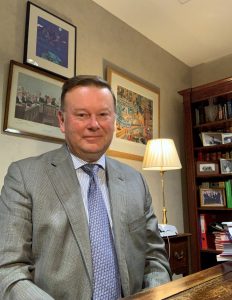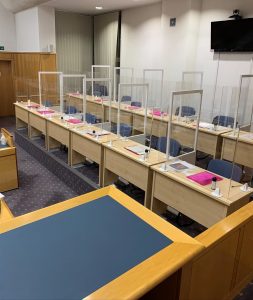Efficiency and safety at Sheffield Crown Court
His Honour Judge Jeremy Richardson QC, The Recorder of Sheffield shares how collaboration and planning have made Sheffield Crown Court COVID-19 secure. HHJ Richardson QC explains:
“My initial reaction when we stopped trials on 23 March 2020 was twofold. How on earth are we going to resume trials in practical terms and how are we going to clear the inevitable backlog? To address this, during that week and beyond, we immediately:
- Set up a procedure for assessing urgent non-jury work in court.
- Relisted trials – either in court (custody cases) or administratively (bail cases). At that stage we naively thought we might be through the worst of this by the summer!
- Recognised that we had to catch-up with the non-jury work as soon as possible – a recovery plan for that was devised and we caught up in April.
- Immediately started to assess how we could get the required people through the building safely.
We held daily remote coordination meetings between senior HMCTS officials on the North Eastern (NE) Circuit, Resident Judges and Presiding Judges. This allowed us to know what we were all doing and get a circuit-wide plan of action. This resulted in immediate protocols by early June 2020 and a Trials Recovery Plan (TRP) was adopted by the entire NE Circuit.
A key component of the TRP was the concept of a Future Trial Review whereby a court had a close look at a trial listed about three weeks ahead with a view to resolving the case, making sure it was trial-ready and, if so, make detailed directions for trial. This has helped resolve cases and make trials more effective when they are listed. The TRP also timetabled witnesses very carefully to enable social distancing and limit footfall in the building. We might keep this long after this crisis is over, simply because quite a lot of cases resolve at that stage and it ensures an efficient hearing.
Practice, practice, practice
We held rehearsals with court staff, the profession and judges to work-out how we could conduct trials at a practical level. We set up a special committee to deal with practicalities and problems. We have worked incrementally at Sheffield to gradually build up the daily level of trials whilst keeping on-top of all non-jury work.
By the middle of September, we had been able to increase our four trial courtrooms to five and by January 2021 we expect to be operating six with a plan to increase further to seven.
It seems to me that there are three key elements to solving the problem we had and continue to endure:
- Cooperation/collaboration between HMCTS, judges and the profession (Bar and Solicitors). We achieved this by regular meetings.
- Clear strategic planning – the TRP and all that flowed from it at a local level. An example at Sheffield has been the modified adjusted trial times whereby we stagger the start/finish times of trials to manage footfall in the building, enabling safe movement.
- Rehearsal and practicing procedures so that everyone knew how to do the new way of working. Snags can be spotted and solved.
I chair a weekly remote Special Court User Group, which has been an essential feature of our recovery plan in Sheffield and has worked exceptionally well. It means that any issues – good or bad – can be immediately addressed. It has enabled close cooperation and communication to deal with all of the above and includes HMCTS, Barristers, Solicitors, Witness Service, Prisoner Escort and Custody Service , the local prison, and others when needed or they wish to come for a particular issue.
There’s no denying that the pandemic has changed the way we work. We are all doing jobs in a way that we never envisaged 12 months ago. All of us have missed the way we did things. Although we have got used to it, we look forward to a resumption of normal service.
I am much more used to technology and working remotely. Having to conduct some trials using two courtrooms has been challenging, but it now poses much less of a problem and we are just about to experiment with using a remote dock for a trial.
There is a pride that we have managed to keep the show on the road. I feel we have not just chugged along, but we have made concerted efforts to upscale and improve our service to ways that approximate what we were doing before 23 March this year. We are not there yet, but we hope to be quite soon. This has nothing much to do with me – it is the staff and the profession who have made it work. All I have done is make a few suggestions as to the voyage we have to undertake. I have endeavoured to provide a map and compass on our voyage of discovery.”
The Recorder of Sheffield
His Honour Judge Jeremy Richardson QC
Please note that individual courts have different measures based on their capacity to ensure the safety of everyone in court.


